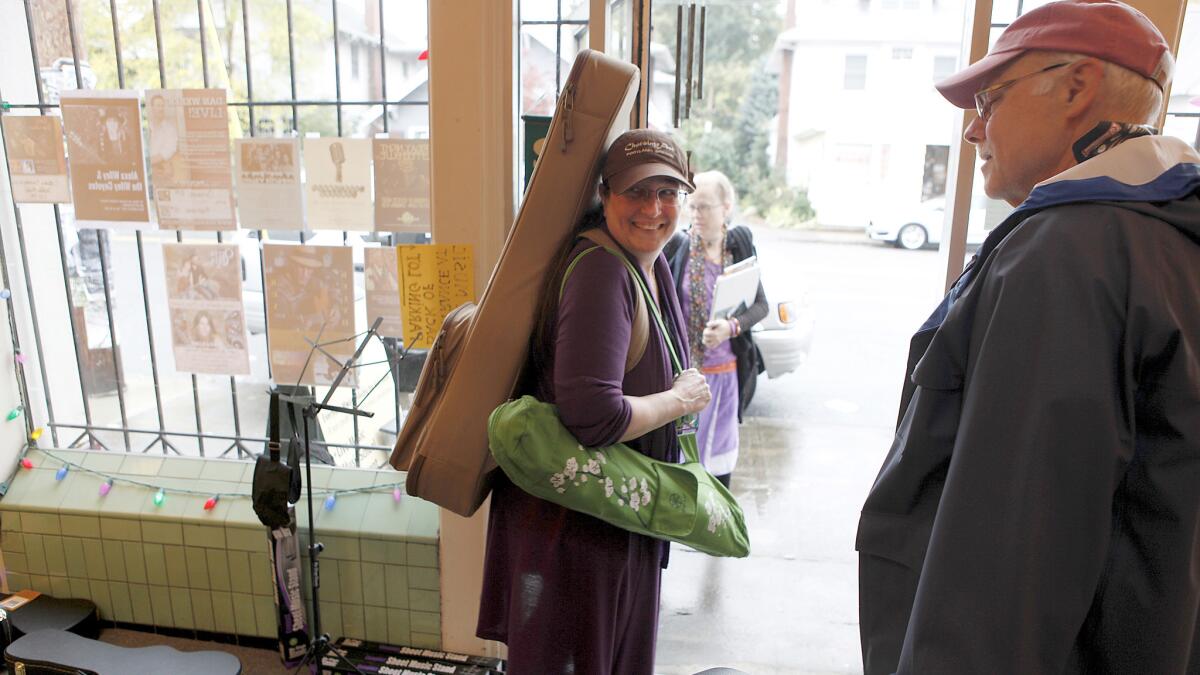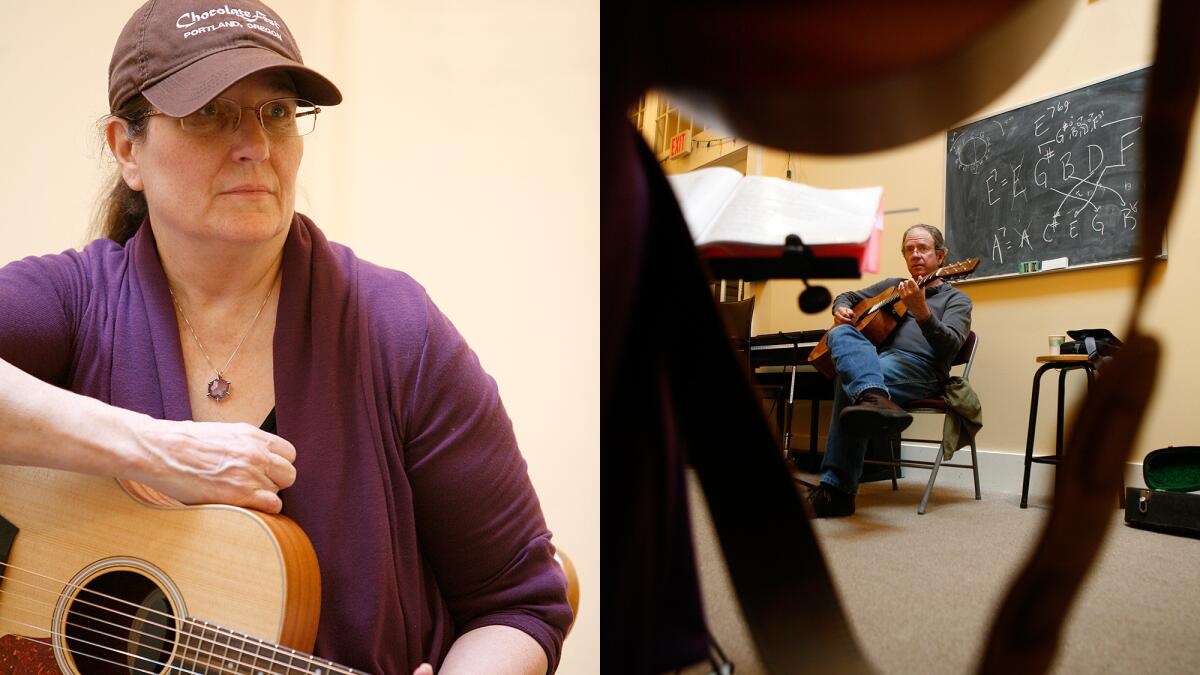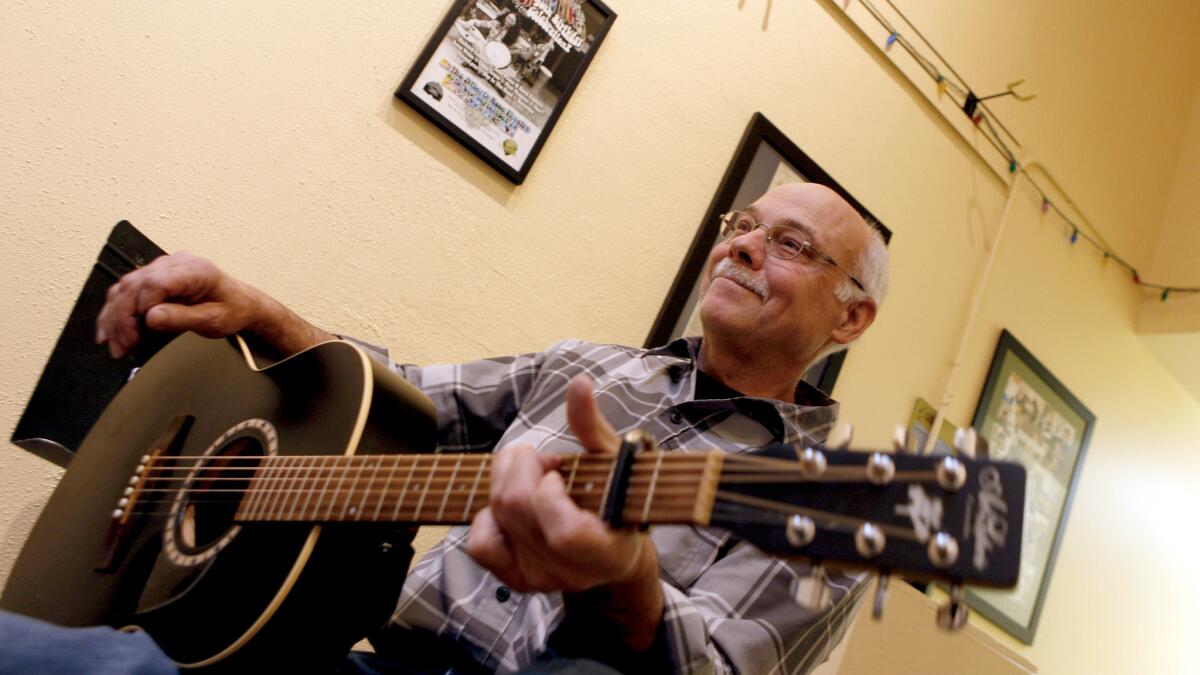Music group gives veterans a guitar, a voice and a place to share stories

On a rainy Saturday in September, Trish Woodbury walks into the Northeast Portland American Legion Hall with a guitar case slung over her shoulder and a Minnesota Golden Gophers ball cap on her head.
“It’s my Northwest umbrella,” she explains.
Woodbury, 62, was only really interested in becoming a female Bob Hope with the USO when she visited an Army recruiter’s office in San Diego in 1974. Instead, she ended up enlisting, and soon was the only woman stationed in a biomedical repair shop at Ft. Bragg, N.C.
“I was a hippie who joined the Army,” recalls Woodbury, who now works as a doula. “I learned a lot of stuff there, but none of it had to do with entertaining the troops.”
She learned the horror of being kidnapped and raped by a male soldier, for one thing. “I didn’t report anything,” she recalls. “I remember a woman who was raped and she reported it, and it was a big joke. So other women, including me, didn’t say anything, either because we wanted a military career or didn’t want to be harassed.”
Woodbury was left with post-traumatic stress disorder from what’s classified as military sexual trauma. The incident shattered her self-confidence and sense of safety for a spell, but she hails from a military family, and her commitment to service remained.

After leaving the Army, Woodbury joined California’s National Guard for three years. Then, after an 18-year civilian break, she logged 15 years with the Oregon National Guard, where she was a human resource specialist until 2013. Then one day, she saw a flyer at the Portland Vet Center for a group called Soldier Songs and Voices that met every Sunday at a Presbyterian church in Southeast Portland.
Founded by Americana musician Dustin Welch in Austin, Texas, the nonprofit evolved from the Welcome Home Project, which released a benefit CD that Welch contributed to. Upon rechristening the group, Welch — who is not a veteran — shifted the meeting venues from sterile classrooms to honky-tonks.
Every veteran who shows up is given a guitar, but other than that core tenet, each of the group’s eight chapters is permitted to function as it sees fit. Whereas the ex-soldiers in San Marcos, Texas, typically meet on the patio of Cheatham Street Warehouse to drink beer, smoke cigarettes and swap songs and stories, the Portland sessions are more like group lessons, where musical theory is discussed and pupils are subjected to various songwriting exercises.
Intrigued, Woodbury followed up with one of the group’s leaders, a local musician named Carl Solomon, who invited her to attend the next meeting. He gave her a guitar and patiently taught her to strum out chords and write songs. Nowadays, she’s his most prolific pupil.
Woodbury now owns five guitars and has written some 30 songs since joining Soldier Songs and Voices, which recently switched its meeting space to a well-known acoustic music venue called Artichoke Music. A recent Sunday gathering there included half a dozen ex-soldiers who also suffer from post-traumatic stress disorder.
Leading the group was Robert Owen, a mustachioed Army vet and folk musician with a soothing demeanor. His pupils were assembled in a circle in a bright, high-ceilinged room, with coffee and Oreo cookies available. Woodbury was there with her Golden Gophers hat on; early in the meeting, she revealed that she’d reworked the melody of Bob Dylan’s “Knockin’ on Heaven’s Door” to include lyrics that weren’t “horrible thematically.”
“Spin, spin, spinnin’ in my head/Kissin’ frogs and hugging’ toads/Leading down the same old road/Nothing’s normal after 5,” she sings in a warm, husky tone.
Today, the group has brought in a guest guitar instructor named Tom Scharf, who walks the fledgling musicians through a 12-bar blues progression. Chad Garrett, a former Army policeman who now works as a McDonald’s cashier, seems especially determined to nail the lesson, and after much struggle, he more or less does.
While stationed in Germany, Garrett says he had a commander who “pushed too hard” and tried to destroy his career. This provoked his PTSD.
“I spent two years in hell, and that’s just too much,” he says.
Since leaving the Army, he’s taken a variety of medications, the combination of which has led to a nerve conduction problem he says tricks his brain into thinking his feet are in pain. But after drilling that blues progression, his focus mercifully shifted.
“Normally I’m 24 hours in pain,” he told the group. “Just a few minutes ago, it went down to about a two.”

Woodbury uses words including “cathartic” and “therapeutic” to describe the impact singing about her most painful experiences has had on her. Nontraditional efforts to help veterans deal with past trauma are increasingly gaining acceptance in mainstream military circles.
“The arts, in general, are among the most important rehabilitative forms for people who’ve seen unspeakable atrocities,” says Berkeley psychologist Michele Ritterman, who’s written extensively about torture victims. “They’ve experienced things that to talk about them in the linear discourse of conversation is impossible. A song is a way to tell a story with a lot of passion, emotion and non-linear phenomena. When you’re trying to tell a story about things that blew away the cognitive mind — that’s what PTSD is — what other modality exists than the arts?”
But Solomon has had a handful of incidents where what one participant shares has provoked a strong emotional reaction in another, which concerns University of Toronto neuroscience professor Michael Thaut.
“PTSD is a very serious cognitive disorder, so people who suffer from PTSD need very good care and very good professional care,” says Thaut, who’s written about the impact of musical therapy on brain-injury sufferers. “If a guy breaks down, musicians don’t know how to deal with that — because they’re not trained to. People getting together to share music is a good thing, but musicians should not dabble in therapy. If you’re dealing with PTSD and asking people to express themselves, you’re in some kind of therapy universe. There needs to be a professional attached to it.”
Coincidentally, Solomon happens to be a licensed rational emotive cognitive behavior therapist. “I’m not giving them prompts like, ‘When was the first time you shot your gun in combat?’” he said. But if a vet’s breakdown feels like it might lead to something serious, like suicide, he adds, “I could open my bag of tricks as a therapist or counselor and do some things, and I would. But I’m also gonna make sure that it’s purely triage, and we’re gonna get this person to somewhere where they need some therapeutic help.”
After the meeting at Artichoke Music, Woodbury plays a song about a homeless vet she encountered called “A Little Bit Drunk and a Lotta Bit Broke.”
“Gave him a light and gave him a smoke/He’s a little bit drunk and a lotta bit broke,” she sings. “Saw 82nd Airborne on the side of his jacket, peeking out from an old Army blanket/…We never even spoke/Now I’m a little bit drunk and a lotta bit broke.”
“I write sad songs, but I’m not a sad person,” says Woodbury. “I’m the happiest blues writer you’ll find.”
Seely is a special correspondent.
ALSO
Why did Trump win? Because Democrats stayed home
They made it home from Vietnam. Now, these vets battle a rare form of cancer
Citing service on Veterans Day, Obama urges nation to ‘forge unity’ after bitter election
More to Read
Start your day right
Sign up for Essential California for news, features and recommendations from the L.A. Times and beyond in your inbox six days a week.
You may occasionally receive promotional content from the Los Angeles Times.






